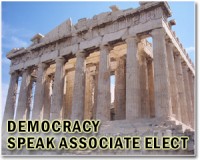| . |  |
. |
Baghdad (AFP) April 25, 2011 Iraqi Shiites, dominant since the 2003 fall of Saddam Hussein and his Baath party, see the Arab nationalist party's branch in Damascus as a bulwark against a rise to power by Syria's majority Sunnis. Though officially Prime Minister Nuri al-Maliki, himself a Shiite, has defended pro-democracy protests across the Arab world, several Shiite politicians are more pragmatic in their view of the regime in Damascus. "The Baath party in Syria is totally different from the Baathist criminals who ruled Iraq," said Jalaladdin Saghir, a former MP and leader of the Supreme Iraqi Islamic Council (SIIC), a Shiite political group. "Do not forget -- their (Syria's) leaders helped the opposition fight Saddam Hussein," he added, referring to longtime rivalry between the Baath parties in Damascus and Baghdad. "In any case, Iraq would be the country most affected by instability in Damascus," he said. Founded in Damascus in 1947 by the Christian Michel Aflaq and the Muslim Salah Bittar, the Baath party was a secular grouping which tied Arab nationalism to socialism. It came to power in Syria in 1963 and in Iraq in 1968, in both instances following coups. In the two Arab neighbours, the party represented a minority: in Syria, Alawites -- members of an offshoot of Shia Islam -- rule over a Sunni majority and, in Iraq, Sunnis under Saddam governed a predominantly Shiite country. But rapidly, the two "branches" of the pan-Arab party moved in different directions. In August 1980, Syria and Iraq severed diplomatic relations, as Damascus backed Tehran after the outbreak of the Iran-Iraq war. And throughout Saddam's rule, Syria gave refuge to his political opponents, notably Maliki himself. But pro-democracy rallies in Syria, inspired by uprisings in Tunisia and Egypt that overthrew those countries' dictators, have culminated in a bloody crackdown which activists say has cost more than 360 lives. The demonstrations have raised the spectre of the fall of President Bashar al-Assad's regime and the rise to power of majority Sunnis for the first time since Syria's coup four decades ago. That has sparked fears among Iraqi Shiites of Syria being governed by Salafists, a radical form of Sunni Islam that is anti-Shiite. "There is no doubt that if the Salafists come to power, this will spark a sectarian war across the region," SIIC's Saghir said. Khaled al-Assadi, a Shiite MP who is close to Maliki, told AFP he was convinced that "foreigners are intervening in the situation in Syria," in reference to alleged support by Sunni Arab regimes for the protesters. "As we did regarding Bahrain, we are against all interference which weakens a country and pushes it towards sectarianism," Assadi added. Iraq condemned the Saudi-led military intervention after pro-democracy protests erupted in Bahrain spearheaded by the Gulf state's majority Shiite community against its Sunni rulers. "Everything that happens in Syria has a major impact on Iraq, and while the Baathist regime played a negative role in the past, it is still better than an Islamist regime," said Baghdad University political science professor Hamid Fadhel. He was referring to Iraq's accusations of Damascus shielding insurgents, including those behind massive bomb attacks against the foreign and finance ministries in Baghdad in August 2009 that killed 95 people. The diplomatic spat prompted the two countries to recall their ambassadors for a year. "If the Islamists came to power, it's clear they would have been helped by Saudi Arabia and other Sunni countries. This will impact Iraq because they will try and push Sunnis here to work against a government dominated by Shiites," Fadhel said.
Share This Article With Planet Earth
Related Links Democracy in the 21st century at TerraDaily.com
 Arab demos against 'tyranny' justified: Maliki
Arab demos against 'tyranny' justified: MalikiBaghdad (AFP) April 23, 2011 Rallies across the Arab world are justified because of the "tyranny" and "oppression" many protesters suffer from, Iraqi premier Nuri al-Maliki said in comments released by his office on Saturday. "We think that the protests are normal and expected because of what many of these people are suffering from - tyranny, oppression, corruption and lack of development," Maliki told a South Korean n ... read more |
|
| The content herein, unless otherwise known to be public domain, are Copyright 1995-2010 - SpaceDaily. AFP and UPI Wire Stories are copyright Agence France-Presse and United Press International. ESA Portal Reports are copyright European Space Agency. All NASA sourced material is public domain. Additional copyrights may apply in whole or part to other bona fide parties. Advertising does not imply endorsement,agreement or approval of any opinions, statements or information provided by SpaceDaily on any Web page published or hosted by SpaceDaily. Privacy Statement |